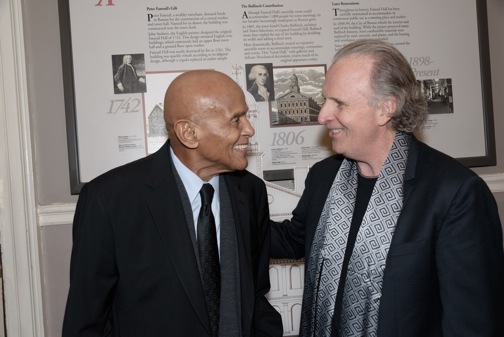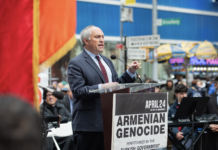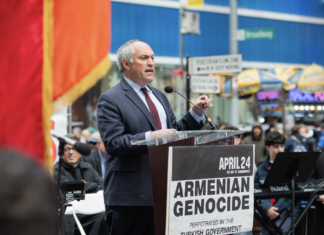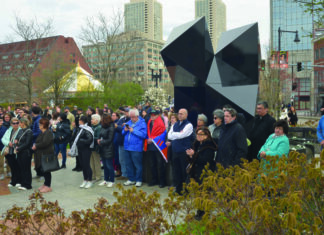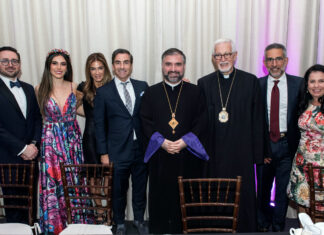BOSTON — The Armenian Heritage Foundation’s K. George and Carolann S. Najarian, MD Lecture on Human Rights scored a coup when it booked singer, actor and human rights activist Harry Belafonte to lecture on the topic of “Justice and Equality: Inspiring Activism.” About to turn 90 years old, Belafonte himself is an inspiration as an activist for justice and civil rights. He took the podium on November 3 in Faneuil Hall and delivered an almost 40-minute talk pointing toward the need to have a “rebel heart” in order to change the world for the better. He peppered his talk with moments of wry humor as he delivered a panorama of his life.
The evening began with Dr. Carolann Najarian’s words of greeting. She informed the audience comprising both Armenians and non-Armenians that “The Armenian Heritage Park Foundation presents these lectures as a gift to the city of Boston on behalf of the Armenian immigrants such as my parents, and George’s parents, who sought and found refuge here from the genocide which was taking place in their homeland. It is our way of saying thank you to the community that saved us.”
Roger H. Brown, president of Berklee College of Music since 2004, then introduced Belafonte.
He reminded the audience that Belafonte’s breakthrough record album “Calypso” was the first album by a single artist to sell 1 million copies in the US. Belafonte became known as the king of calypso. As an actor, he appeared in dozens of films and became the first African American to win an Emmy.
However, Brown said, Belafonte “is not an artist who took an interest in activism. He is an activist who happened to be a brilliant musician.” For him, music is not just entertainment, but the way to change the world. In the 1950s, Belafonte met Martin Luther King Jr. and became a vital force in the American civil rights movement, He paid to bail King out of Birmingham city jail in 1963, and raised funds to free other civil rights protestors. He helped finance the Freedom Riders and voter registration drives. He was among the organizers of the historic August 1968 march on Washington and was next to King when the latter delivered his famous “I Have a Dream” speech.
In the 1980s, Brown continued, Belafonte proposed the idea of enlisting top musicians in 1985 to write and sing the benefit song “We Are the World,” for African famine relief. It became the fastest selling American pop single in history. After retiring from performing, Belafonte continued his advocacy for civil rights and in 2013 founded Sankofa, a social justice nonprofit organization.



